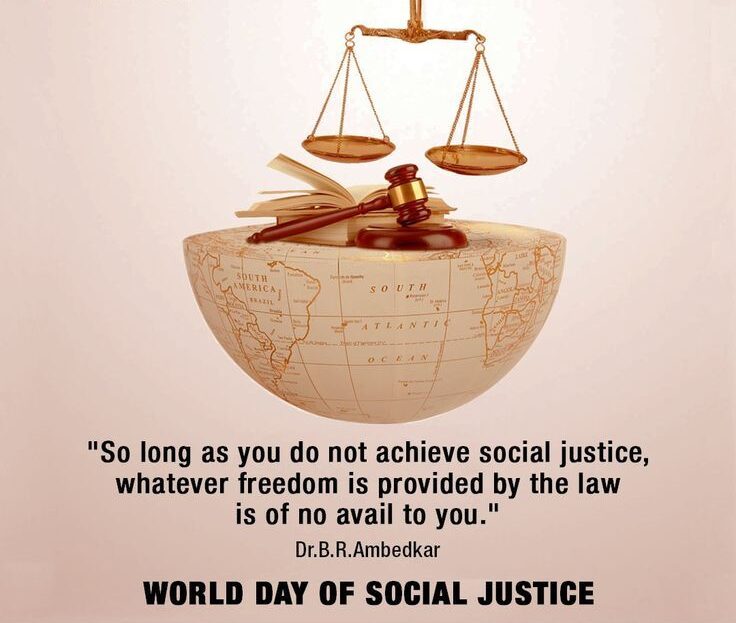10 Powerful Reasons Why World Day of Social Justice Matters: A Global Call for Fairness
World Day of Social Justice, celebrated on February 20th, is a day dedicated to promoting social justice around the world. It highlights the importance of equality, fairness, and human rights for all individuals, regardless of their gender, race, or socioeconomic background. The day calls for action to address pressing social issues like poverty, inequality, and human rights violations, and strives to make the world a more just and equitable place for everyone.
What is World Day of Social Justice?
The World Day of Social Justice was established by the United Nations in 2007, with the aim of promoting the principles of justice and equality across the globe. It is a day to recognize the need for social inclusion, equal opportunities, and the importance of fostering an environment where everyone has access to their basic rights and opportunities, regardless of their background.
The focus of the day is on advancing social justice, which is central to achieving peace, human rights, and sustainable development. Social justice encompasses a wide range of issues, from gender equality, education, economic fairness, healthcare access, and environmental sustainability, to human rights and labor rights. The day serves as a reminder that we must work together to eliminate social inequalities and build more inclusive societies.
History of World Day of Social Justice
The concept of social justice has been around for centuries, but it was not until the early 2000s that the United Nations officially recognized the need for a global day to celebrate and promote it. In 2007, the UN General Assembly declared February 20th as the World Day of Social Justice, with the goal of raising awareness about social injustice and urging people worldwide to take action to reduce inequalities in society.
This day is also linked to the Millennium Development Goals and the 2030 Agenda for Sustainable Development, which include ending poverty, promoting gender equality, and creating decent work opportunities for all.
In the years following the establishment of this observance, governments, civil society organizations, businesses, and individuals have increasingly taken part in various initiatives to address social injustices, raise awareness about inequality, and work towards a fairer and more just world.
Daily Life Impacts of Social Justice
Social justice affects daily life in many ways, from access to basic resources like food and clean water to fair treatment in education, the workplace, and legal systems. When social justice is achieved, it leads to greater equality, opportunity, and overall well-being for everyone. Here’s how social justice impacts daily life:
- Improved Quality of Life: A more just society ensures that everyone has access to basic human needs, such as education, healthcare, and housing. This leads to an improved quality of life for all people, particularly those in marginalized communities.
- Economic Opportunity: Social justice promotes equal economic opportunities, meaning everyone has a chance to thrive, regardless of their background or identity. When people are given equal opportunities to succeed, economies flourish, and prosperity is shared more equitably.
- Equal Rights and Opportunities: When social justice is prioritized, laws and policies protect the rights of every individual. This means that no one should face discrimination based on their gender, race, or socioeconomic status. Equal access to education, employment, and legal rights is a crucial part of social justice.
- Sustainability: Social justice also promotes environmental sustainability, ensuring that future generations inherit a planet that is healthy, safe, and capable of supporting their needs. Fair access to natural resources and reducing environmental harm are part of a more socially just world.
Significance of World Day of Social Justice
- Fostering Equality: The day draws attention to the importance of creating equal opportunities for all people, regardless of their race, gender, religion, or economic background. It emphasizes that equality is essential for a harmonious and thriving society.
- Raising Awareness About Social Issues: World Day of Social Justice raises awareness about ongoing social issues such as poverty, discrimination, injustice, and inequality. This helps ensure that these issues are not overlooked and are addressed in meaningful ways.
- Encouraging Action: The day encourages governments, organizations, and individuals to take action and advocate for changes that can create a more just and fair society. It calls for reforms in policies, legal systems, and practices to eliminate the social barriers that hinder progress for many.
- Promoting Human Rights: Social justice is deeply linked to human rights. By observing this day, we reaffirm the fundamental principles of human dignity, equality, and non-discrimination that should be afforded to everyone.
- Global Solidarity: World Day of Social Justice promotes a sense of global solidarity, where people unite to fight against injustice and inequality. This collective action can have a far-reaching impact in creating global change.
How is World Day of Social Justice Observed?
World Day of Social Justice is observed through a variety of activities and events designed to raise awareness about social issues and promote actions that advance justice and fairness. Here are some common ways the day is observed:
- Educational Campaigns: Schools, universities, and community organizations often hold discussions, seminars, and events to educate people about the importance of social justice and the issues that need to be addressed.
- Advocacy and Protests: Social justice activists and organizations often use this day to organize protests, campaigns, and advocacy efforts to demand changes in policies and practices that perpetuate inequality.
- Social Media Campaigns: Social media plays an essential role in spreading the message of social justice. People share information, stories, and initiatives online to raise awareness about the importance of fair and equal treatment for all.
- Community Service: Many people choose to observe World Day of Social Justice by volunteering or participating in activities that support those in need. This could include supporting local food banks, helping marginalized communities, or donating to organizations that fight for social justice.
- Government and NGO Initiatives: Governments and NGOs often host conferences or initiatives on this day to focus on solving key social problems and advancing social justice policies.
Wishing on World Day of Social Justice
On this day, we can share messages that encourage others to stand up for social justice and advocate for equality and fairness. Here are some sample messages:
- “Happy World Day of Social Justice! Let’s work together to build a more just and inclusive world for all.”
- “On this World Day of Social Justice, let’s honor the rights of every human being and commit to fighting inequality and injustice everywhere.”
- “Wishing everyone a meaningful World Day of Social Justice—let’s unite for equality, fairness, and opportunity for all.”
Conclusion
World Day of Social Justice is a day to reflect on the importance of fairness, equality, and human rights in creating a better world. Whether it’s through advocacy, education, or action, this day encourages everyone to be part of the movement towards a more just and inclusive society. By addressing inequalities, promoting opportunities for all, and fostering social inclusion, we can make a significant impact and help build a world where justice is accessible to everyone.










